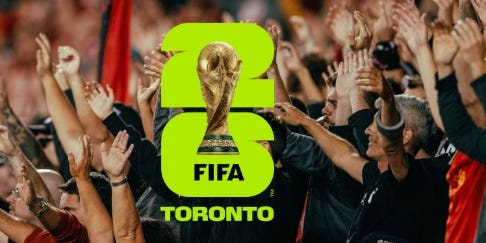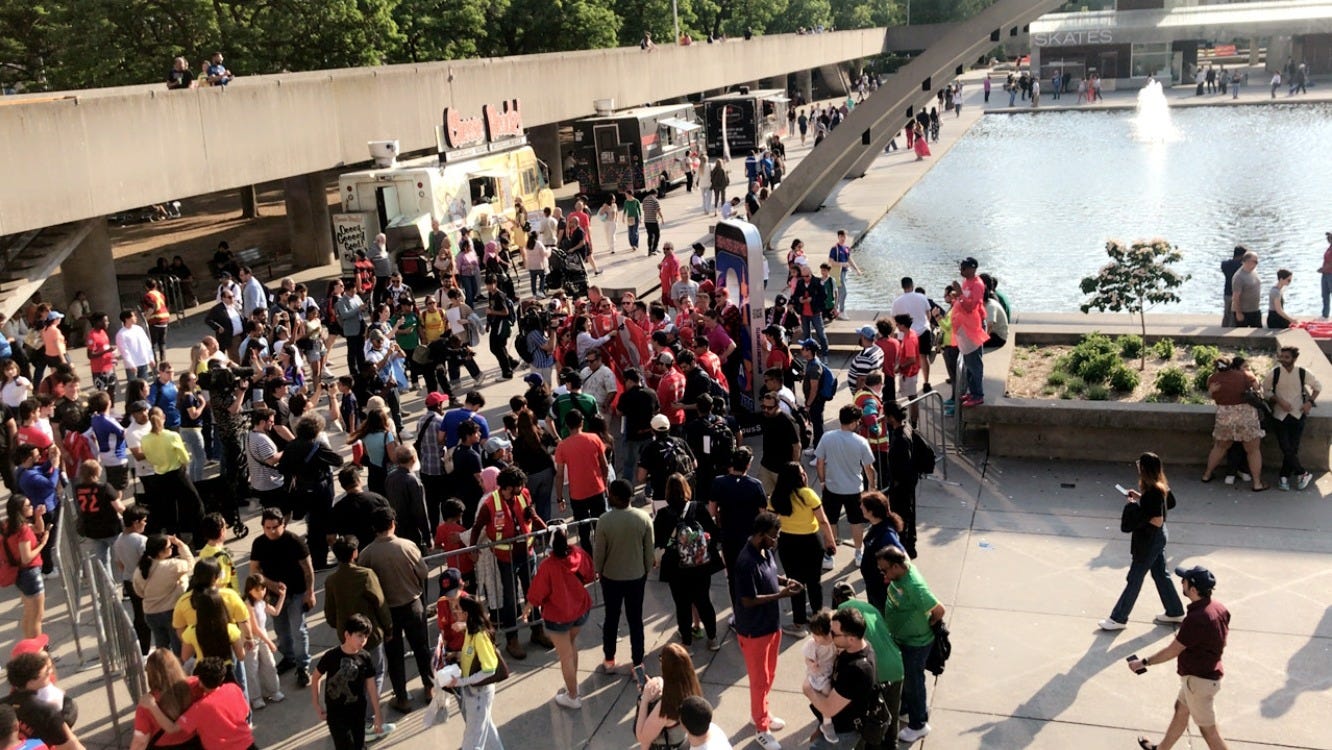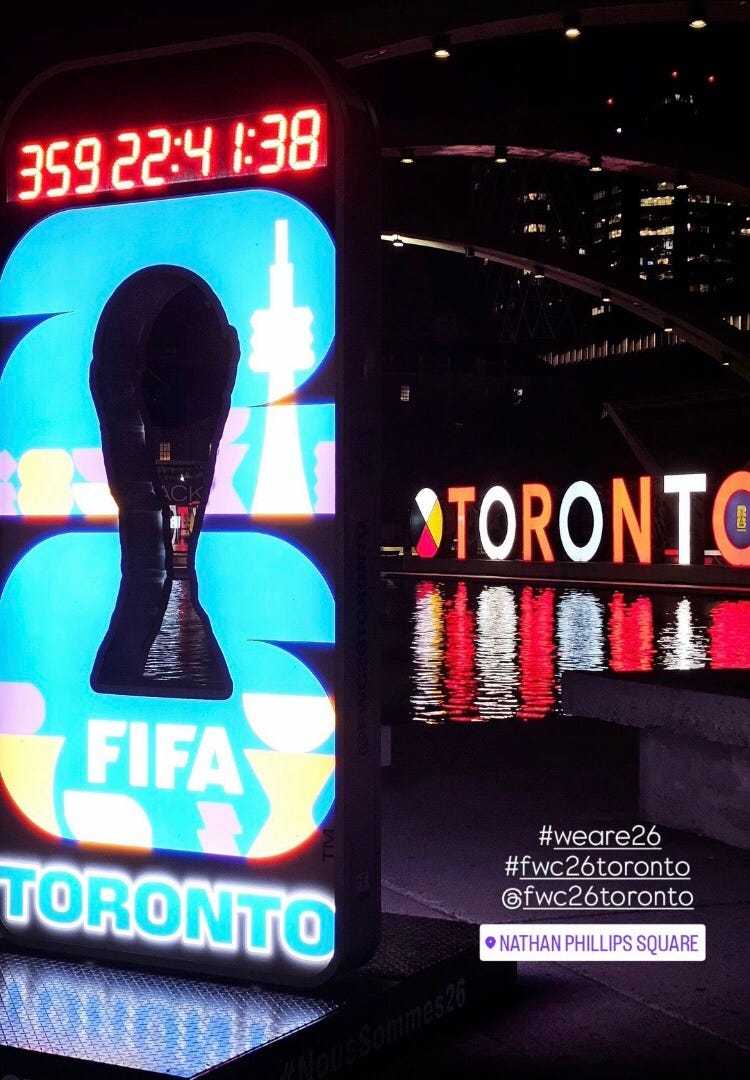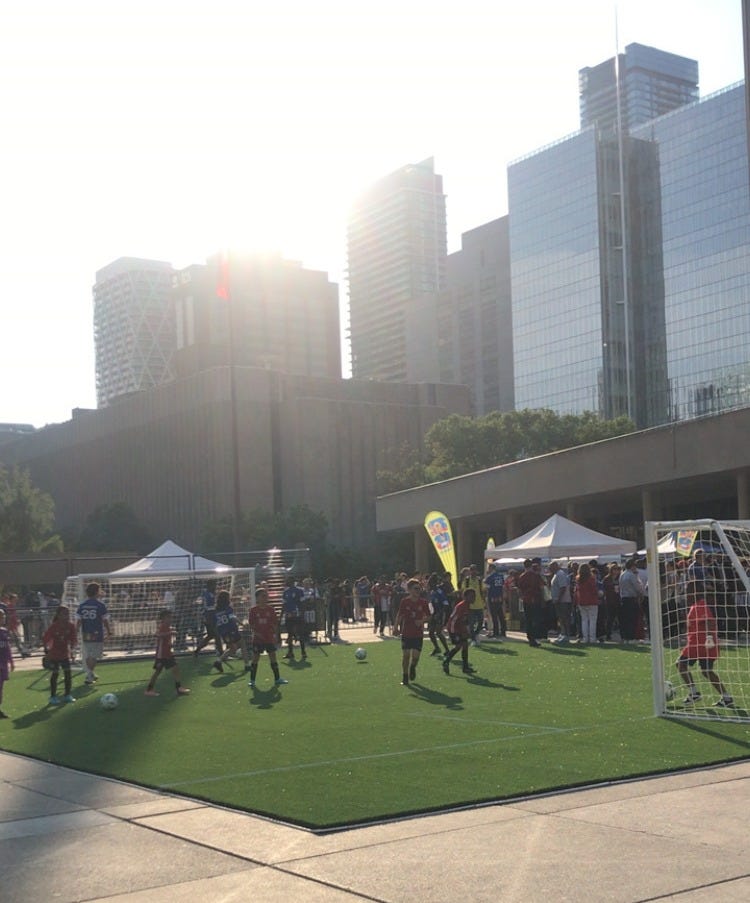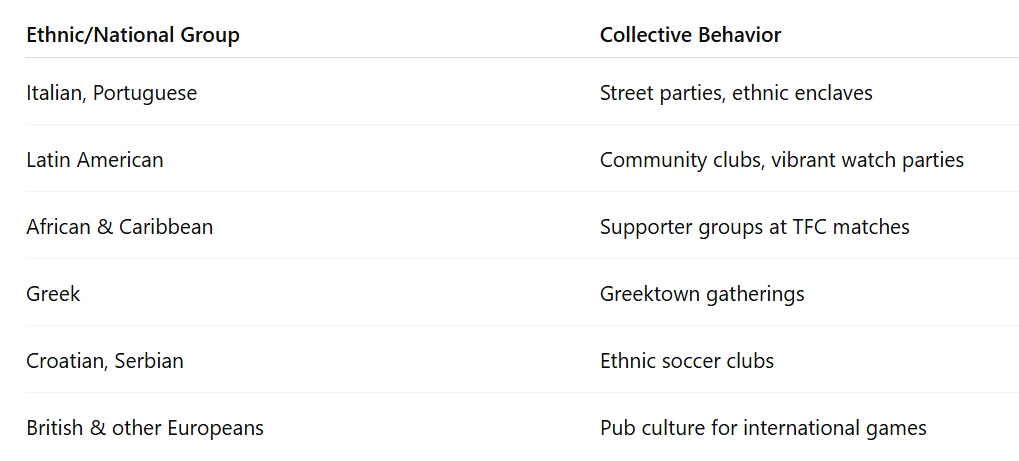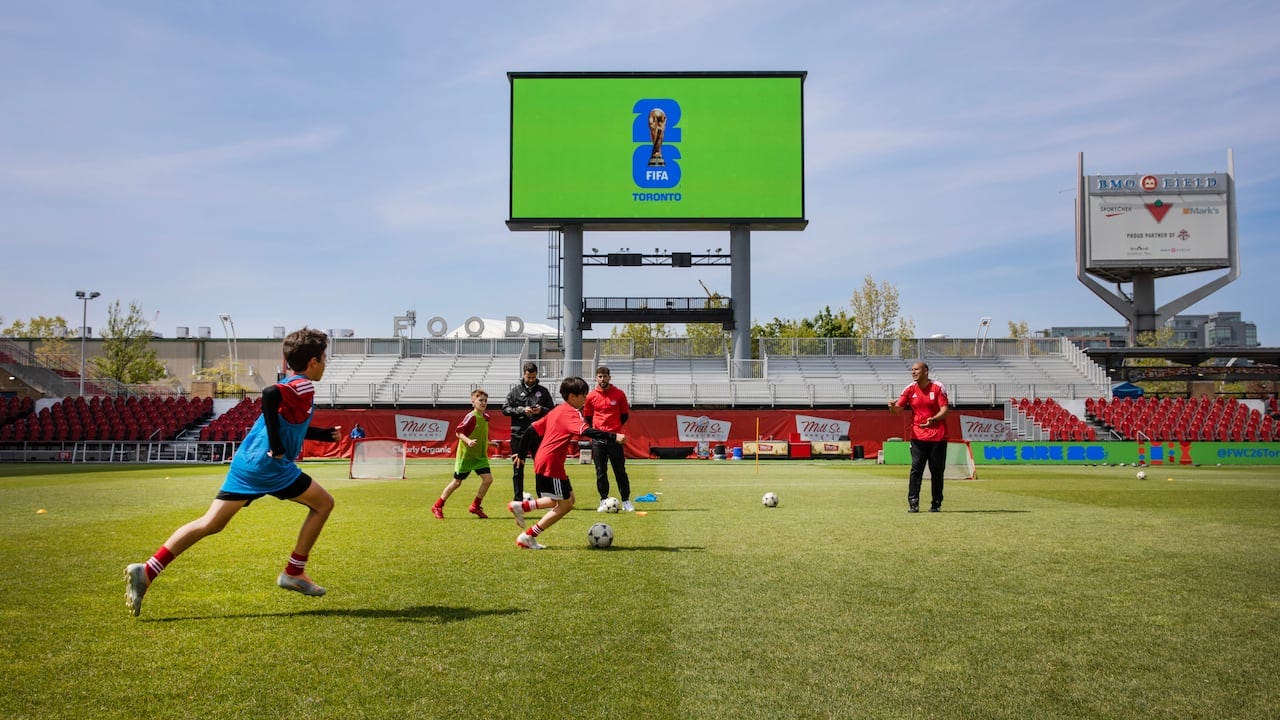The "Bigger Ball" Effect
Every goal celebrated, every stadium aglow, and every anthem sung enhances a city's charm and influence, creating positive impressions worldwide for #WeAre26. Events like the World Cup, captivating over 3 billion viewers in 2014 and growing in our digital age, along with regional tournaments, have become global celebrations. They present host cities and nations as vibrant and modern. The thrilling moments of these tournaments drive lasting change through improved infrastructure, increased tourism, and enriched cultural connections that last well beyond the final whistle. It’s a joy to witness how football can unite and inspire us.
Context: #WeAreToronto
#The game of the people: I have seen popular children of immigrants from everywhere at Nathan Phillips Square, a diverse city.
Football in North America was constantly pushed and left for women and minorities in male sports (immigrants who had lately settled ) after the world wars, as they call it, soccer, to differentiate it from their American football.
On June 12, I observed the ambiance and set-up in Toronto to see how they will endorse the upcoming World Cup 2026. With one year remaining before the start of the FIFA World Cup, I saw their activation, activities, and community engagement.
Conversely, the ethnicities present there show a variety of Ronaldo and Messi jerseys, alongside South American and African national team jerseys, worn with enthusiasm and excitement. A richly multicultural crowd comprises Indigenous peoples, members of local soccer clubs, and diverse segments of Toronto’s diaspora, including Portuguese, Italian, Caribbean, South Asian, and more.
Even if football is part of the second option as a sport in the North American landscape, no doubt!
Soccer embodies the spirit of community. It was shaped by immigrants who brought their passion for the game into their daily lives, making it a vibrant and universal sport for everyone!
That is the case in Toronto, Canada. Since I have lived here, the people I have played soccer with have a football culture and heritage due to their background in a country where football is the number 1 sport.
But how the game landed here,
Immigrant Influence – Post-War Boom.
Toronto's identity as a multicultural city made soccer grow rapidly after WWII. Italian, Portuguese, Greek, Caribbean, and Eastern European immigrants brought their love of football, forming ethnic clubs and regional leagues.
Indeed,
The history of Soccer in Toronto and Canada is deeply rooted. As the most populous city in the country, any sport that required a gathering of 22 like-minded souls would always prosper where there were more people. Toronto's roots in soccer go even deeper than many realize.
The first game of Association Football was played in the City of Toronto on October 21, 1876, between the football teams of Carlton Cricket Club and Toronto Lacrosse Club.
One year later, on February 21, the Dominion Football Association was formed. It was the first such body outside of the British Isles. From these small starts, Toronto had proven that it was set to be a significant influence on soccer in Canada.
#Being part of the soft power alignment for storytelling and legacy.
The bigger the ball, the bigger the attention.
Toronto seeks recognition for this, particularly regarding the surge in tourism and the ongoing interest in enhancing its marketing as a sports city.
Football is watched by billions of people worldwide, and as fans, we always remember where every World Cup has been played.
Therefore, football offers an appealing platform for diplomacy and soft power, even if a country or a city does not have a footballing tradition.
With the new FIFA World Cup format, cities can be part of the host if they want, with multiple countries involved. This new format for the 2026 World Cup allows for a more inclusive and diverse hosting experience. As I call it, 'Let's put the deck together for a proposal,' this format encourages cities to collaborate and present a unified front in their bid to host World Cup matches.
Every city can craft its own stories through its culture and heritage, linking it to the beautiful game to build a legacy. With its rich multiculturalism and deep soccer roots, Toronto has the potential to leave a lasting legacy in the world of soccer.
By hosting FIFA World Cup 2026 matches, Toronto will project an image of cultural openness and sporting excellence with its multiple US Sports Major league franchises and social commitment to a global audience.
Regardless, cities act like global brands, especially when they have a bond between sports culture and history.
And you can't go bigger without including a soccer team or significant events in your portfolio if you want to catch up in the football movement:
#Elevating Toronto's Global Brand:
Showcasing Multiculturalism.
Toronto boasts over 200 cultures and languages. During the World Cup, fans from various nations will fill neighborhoods like Little Italy and Scarborough, displaying flags and traditions at public "Fan Fests." This vibrant atmosphere reinforces Toronto's image as an inclusive city and showcases Canada's diversity and hospitality.
Worldwide Visibility.
An incredible one billion viewers across the globe will be tuning in!
Each moment captured at BMO Stadium, from fan celebrations to stunning skyline drone shots, showcases the beauty of Toronto's waterfront and its vibrant multicultural spirit, beaming into homes everywhere from Tokyo to Toronto. What an exciting opportunity for the most diverse city I have ever lived in.
#Groundwork for FIFA: demographic scanning and hoping the most represented diaspora country in GTA: ticket sales/Tourism-Hospitality.
Working to be the best host city and sell out tickets, partners, and hospitality requires a lot of research and strategic planning. Toronto can use its US and Canadian sports platforms to attract fans to watch summer sports and music festival events like Baseball(Blue Jays), Canadian football (Argos), the Scotiabank Arena Tour, and the Hockey Hall of Fame for a complete sports destination package.
However, if qualified, one of the countries from the group (L, E, I, K) that has the opportunity to play their World Cup match in Toronto, where more nationalities and diasporas are established, could play in front of their fellow compatriots so that they can witness that lifetime experience.
Let's say the Italian national team had the chance to play in Toronto since their friendly in 2005 at SkyDome, which has one of the largest ethnic groups in the GTA.
Census notes: Italian-Canadian heritage is among the top in Toronto, but bear in mind those other groups who can’t wait to experience the unforgettable experience of seeing their home country come into town, such as the one listed here.
Tirage is about luck, they say, but a devoted diaspora presence can help every city that hosts World Cup games maximize its marketing as a destination, boost tourism revenue, and guarantee that tickets sell out, which spends a lot of marketing/dollars by forgetting the strategic essence of football fans’ demand and wish.
Nevertheless, FIFA and the local organizing committees may consider diaspora concentrations in each city’s host when they draw up the match schedule.
#% growth to embrace the beautiful game: Expectations with Toronto FC and Canadian Premier League clubs will build a soccer community, a youth soccer program development business spike, and registration of kids to play the game.
A sparkling lifelong love for the game, every time the beautiful game passes by after the World Cup in every former host country, people have embraced it; the word World Cup is immense to endorse a storyline for any souvenirs and legacy of one opportunity, lifelong.
The last time the World Cup was hosted on North American soil, a league named MLS was formed, which Toronto FC has been a part of since 2007, and youth registration soared.
This is a moment that the Canadian Premier League and clubs should work on to level up Media attention and new public interest in their championship.
Continuing the momentum after hosting a major soccer event in towns has always helped to build a strong culture and expansion.
By coupling:
Commercial acceleration (sponsorship & media rights, more fan presence),
Infrastructure upgrades and expand new clubs from all over the Canadian landscape(stadiums, pitches),
Talent development and academy registration (youth pathways) and
Inclusive legacy programs (women's equity),
The World Cup's soft power will flow directly into Canada's domestic leagues, elevating their global profiles, deepening local fan engagement, and positioning them for sustainable growth on the world stage.
Takeaway: By plugging into a multi‑city, multi‑nation stage, Toronto doesn't just host games. It becomes part of a continental narrative of collaboration, diversity, and high‑impact storytelling. The shared spotlight magnifies Toronto's brand, leverages its multicultural strengths, and builds a sustainable soft‑power legacy long past the final whistle.
In Toronto, football can bridge continents: from immigrant‑run ethnic leagues to more expected packed stands at BMO Field, from grassroots clinics to global broadcasts. "The bigger the ball, the bigger the attention" isn't just a slogan. It's the story of a city that speaks the world's language through a beautiful game.
Money and ROI investments can be discussed later, but one thing is sure: there will be no white elephant facilities, and the marketing investment must be wisely spent to recover the funds.
Thank you for your time and for welcoming everybody to this platform.
Paul Stanislas Dioh


